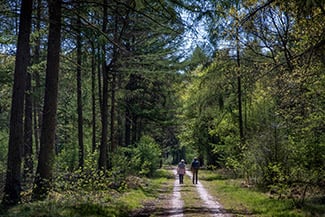Are forests a natural treatment for stress?
 Living in the city appears to be more stressful than living in nature. This is a commonly accepted observation and a growing number of (mostly empirical) studies are highlighting the potential physical and psychological benefits of green spaces. In the present study, conducted in Germany, the scientists aimed to demonstrate whether a walk in the forest was actually better at relieving stress than a walk in the city.
Living in the city appears to be more stressful than living in nature. This is a commonly accepted observation and a growing number of (mostly empirical) studies are highlighting the potential physical and psychological benefits of green spaces. In the present study, conducted in Germany, the scientists aimed to demonstrate whether a walk in the forest was actually better at relieving stress than a walk in the city.More than half of the world’s population currently resides in cities. Numerous studies have established that leading an urban lifestyle has a significant impact on anxiety and mood disorders. On the other hand, living in a rural area, or regularly spending time in nature, could reduce negative emotions and stress, and have other positive effects on our physical and mental health. We have already highlighted some studies on the possible effects of green spaces on cognitive development and particularly on the improvement of attention in young children.
The team of scientists from the Max Planck Institute for Human Development, who conducted the present study, indicate that in a "tense" situation (during specific laboratory tests), the amygdala, the part of the brain involved in processing stress, was less active in rural inhabitants than city dwellers. However, the research wasn’t able to determine whether it was really nature that was having a positive impact on stress management, or if other factors were coming into play. To this end, Sonja Sudimac and her colleagues developed a protocol to establish whether there is a causal influence of urban vs. natural environments on stress-related brain regions.
In late summer of 2019, 63 participants ages 18 to 47 (29 women, 34 men, average age = 27.21 years) went for an hour-long walk either in nature (in the Grunewald forest) or the city (on a shopping street in Berlin). Note that participants all walked alone and were not allowed to use cell phones or go inside stores. Before and after their walk, participants filled out questionnaires and underwent MRI scans during which they carried out “stressful” tasks: the Fearful Faces Task and the Montreal Imaging Stress Task. During the first task (FFT), subjects are presented with male and female faces with fearful facial expressions. The goal of the second task (MIST) is to induce social stress: the subjects must solve timed mental arithmetic tasks that are slightly beyond the subject's cognitive capacities.
The researchers hypothesized that stress-related brain areas (namely the amygdala, anterior cortex and dorsolateral prefrontal cortex) would be less activated in participants who walked in the forest compared to those who walked on a busy Berlin street. Consistent with this hypothesis, the results indicate that amygdala activity decreased after walking in nature, but stayed the same after walking in the urban environment. According to the authors: “going for a walk in nature can have salutogenic effects on stress-related brain regions, and consequently, it may act as a preventive measure against mental strain and potentially disease.” While the study does not provide evidence that urban exposure increases stress levels, it does confirm the importance of creating large and accessible green spaces within cities.
Source: Sudimac, S., Sale, V. & Kühn, S. How nature nurtures: Amygdala activity decreases as the result of a one-hour walk in nature. Mol Psychiatry (2022). https://doi.org/10.1038/s41380-022-01720-6







